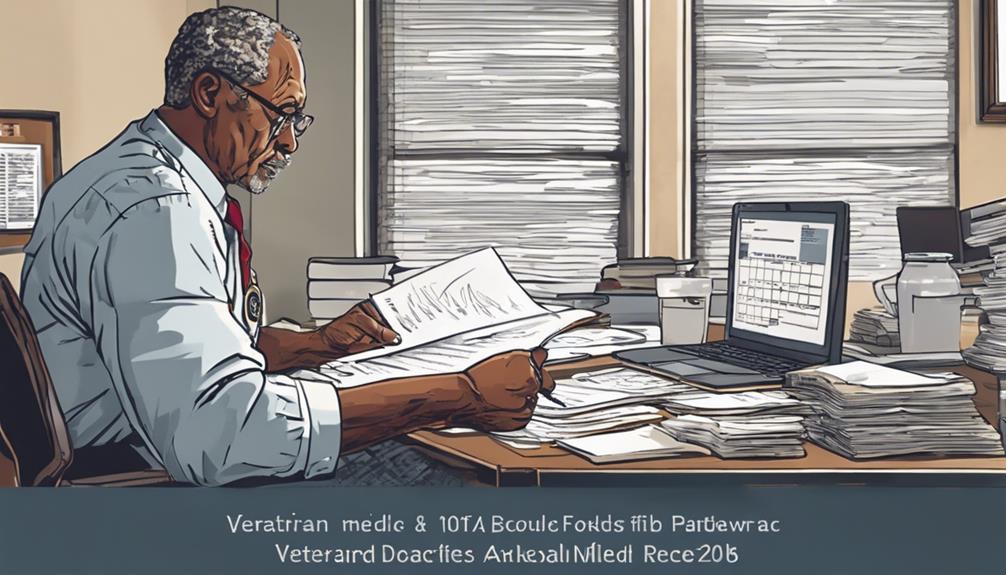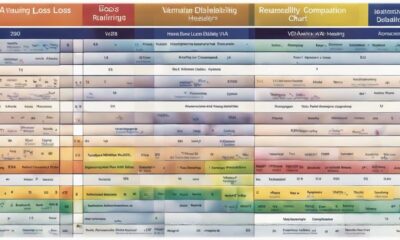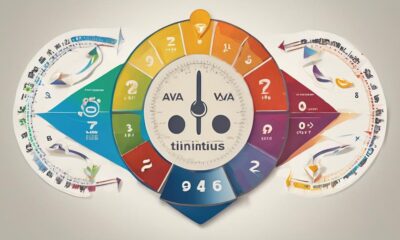Tinnitus
VA Rating Guide: Hearing Loss and Tinnitus
Navigate the complexities of VA disability ratings for hearing loss and tinnitus, uncovering crucial insights that could shape veterans' benefits.

As the adage suggests, “Seeing is believing.” When dealing with the VA Rating Guide for hearing impairment and tinnitus, comprehending the complexities of disability evaluations can greatly impact the benefits received by veterans.
From the initial assessment to the potential for higher disability ratings when conditions are linked, the nuances of the system can impact the support veterans receive.
Exploring how these ratings are determined and the implications for service-related conditions could shed light on crucial aspects of veterans' disability claims.
Key Takeaways
- VA rates hearing loss using Puretone Threshold Average and Speech Discrimination Percentage.
- Establish service connection through in-service events and current medical assessments.
- Secondary service connection links new disabilities to existing conditions for compensation.
- Seek professional help from CCK for appealing denied VA claims and maximizing benefits.
Causes of Hearing Loss and Tinnitus
Exposure to high-intensity sounds, such as gunfire and aircraft noise, frequently precipitates hearing loss and tinnitus among military veterans. Besides combat-related noise exposure, other factors within military service contribute to auditory issues.
Defective protective equipment, like the 3M earplugs case, underscores the importance of reliable gear in preventing hearing damage. Additionally, jet fuel exposure during service can be a hidden culprit behind auditory problems, including tinnitus, highlighting the diverse risks faced by service members.
Moreover, blast injuries in combat zones pose a significant threat, potentially leading to inner ear damage and increasing the vulnerability to hearing loss and tinnitus. Traumatic brain injuries sustained during military service can also heighten the likelihood of developing hearing problems like tinnitus, showcasing the intricate interplay between different health aspects in the military setting.
Understanding these varied causes is crucial in addressing the needs of veterans experiencing hearing impairments as detailed in the VA Rating Guide.
Establishing Service Connection for Disabilities

Hearing loss and tinnitus diagnoses are crucial components in establishing service connection for VA disability benefits, requiring a comprehensive evaluation of in-service events, current medical assessments, and a clear nexus to military service. Licensed audiologists play a pivotal role in this process by conducting audiometric testing, including puretone threshold testing, to accurately diagnose these conditions. Removing hearing aids during these tests ensures precise results for evaluating hearing loss. Service records, medical documentation, and lay evidence are vital pieces of information that help establish the link between the disability and military service for VA benefits. This meticulous approach is necessary for qualifying for VA disability compensation related to hearing loss and tinnitus. The table below outlines the key elements involved in establishing service connection for disabilities:
| Key Elements | Importance |
|---|---|
| In-service Events | Essential |
| Current Medical Assessments | Crucial |
| Nexus to Military Service | Critical |
| Audiometric Testing | Vital |
Secondary Service Connection Explained
How does secondary service connection enhance veterans' access to disability benefits and what evidence is essential in establishing this link between primary and secondary conditions for VA claims?
Secondary service connection allows veterans to link a new disability to an existing service-connected condition, such as tinnitus or hearing loss related to their primary service-connected disability. By proving a direct relationship between the primary and secondary conditions, veterans may qualify for increased disability benefits. Medical evidence plays a crucial role in demonstrating this connection for VA disability claims.
Secondary service connection provides veterans with the opportunity to expand their disability benefits.
It allows for the consideration of additional health issues stemming from the primary service-connected disability.
Veterans can seek compensation for related conditions that impact their overall well-being.
Establishing this link requires thorough documentation and medical records to support the claim.
The process can be complex but is essential for veterans to receive the full benefits they deserve.
VA Disability Ratings Breakdown

To thoroughly evaluate veterans' hearing-related disabilities, the VA utilizes a detailed breakdown of disability ratings based on specific tests and measurements. The VA rates hearing loss by considering the Puretone Threshold Average and Speech Discrimination Percentage. The table below outlines the VA Disability Ratings Breakdown for hearing loss:
| Disability Rating | Puretone Threshold Average | Speech Discrimination Percentage |
|---|---|---|
| 0% | N/A | N/A |
| 10% | 0-15 dB | 94-100% |
| 30% | 16-25 dB | 86-93% |
These ratings are crucial in determining the level of disability compensation a veteran may receive. State-licensed audiologists conduct specific tests such as Puretone Threshold Testing across different frequencies to assess the extent of hearing loss accurately. The VA Compensation and Pension (C&P) exam plays a vital role in establishing service connection for hearing-related disabilities, ensuring veterans with hearing loss receive the support they deserve.
Handling Denied VA Claims
When faced with denied VA claims related to tinnitus and hearing loss, seeking assistance from experienced professionals like Chisholm Chisholm & Kilpatrick LTD can greatly increase the chances of securing deserved disability benefits. Here are some key reasons why veterans should consider reaching out to CCK for help:
- Expert Guidance: CCK's accredited attorneys provide expert guidance on appealing denied VA claims.
- Free Consultations: Veterans can benefit from free consultations offered by CCK to understand their options for pursuing disability benefits.
- Resourceful Support: CCK offers resources such as video content and articles to aid veterans in challenging denied claims.
- Navigating Complexity: CCK's expertise in navigating the complex process of appealing denied VA claims for hearing loss and tinnitus is invaluable.
- Dedicated Advocacy: With CCK's support, veterans can have dedicated advocacy in their corner to fight for the disability benefits they deserve.
Frequently Asked Questions
What Is the VA Rating for Tinnitus and Hearing Loss?
When it comes to VA ratings for tinnitus and hearing loss, the VA typically rates tinnitus at 10%.
Hearing loss is evaluated based on specific tests and frequencies, with ratings ranging from 0% to 100%. Usually, a 10% rating is more common for hearing loss.
These ratings are crucial in determining the level of disability benefits that veterans may receive for these conditions.
How Much Compensation Will I Get for Hearing Loss and Tinnitus?
We typically receive compensation based on the severity of our hearing loss and tinnitus. The VA rates hearing loss from 0% to 100%, with tinnitus usually rated at a fixed 10%. The VA considers these as separate conditions.
Evaluation by licensed audiologists is crucial to determine disability ratings accurately. Veterans may receive higher compensation for hearing loss than for tinnitus due to the varying degrees of severity in each condition.
What Conditions Are Secondary to Tinnitus?
Sure, conditions secondary to tinnitus may include:
- Anxiety
- Depression
- Sleep disturbances
- Insomnia
- Concentration issues
- Irritability
- PTSD
- Hearing loss
These secondary conditions can significantly impact daily functioning and quality of life for veterans. It's crucial to address these secondary conditions as they can be recognized by the VA for disability benefits.
Proper evaluation and treatment of these secondary effects are essential for overall well-being.
What Is the Relationship Between Hearing Loss and Tinnitus?
When it comes to the relationship between hearing loss and tinnitus, it's important to recognize that these conditions often go hand in hand.
Hearing loss can lead to tinnitus as a secondary symptom, with the ringing or buzzing in the ears stemming from impaired auditory function. Veterans experiencing hearing issues may also report tinnitus, highlighting a clear connection between the two conditions.
Understanding this link is key for accurate diagnosis and effective treatment.
Conclusion
Overall, understanding the VA Rating Guide for hearing loss and tinnitus is crucial for veterans navigating the disability benefits process. With proposed changes in 2022, veterans may need to establish a connection to service-related conditions for benefits.
It's essential to seek assistance from veterans disability advocates to ensure a successful outcome. Did you know that over 2.7 million veterans currently receive disability compensation for hearing loss or tinnitus?
Tinnitus
How to Manage Mild Hearing Loss and Tinnitus With Hearing Aids
Discover effective strategies for managing mild hearing loss and tinnitus with hearing aids, offering valuable insights for improving your auditory well-being.

In the context of addressing mild hearing loss and tinnitus through the use of hearing aids, the adage ‘an ounce of prevention is worth a pound of cure’ remains applicable. Yet, what is one to do once these issues have already manifested, and the aim is to find effective strategies for dealing with them?
Well, let's explore some insightful strategies that could make a remarkable difference in your auditory well-being.
Key Takeaways
- Hearing aids reduce tinnitus annoyance and enhance hearing clarity.
- Tailored solutions based on individual needs and lifestyle improve management.
- Opt for advanced hearing aids with tinnitus-masking features for optimal results.
- Counseling and personalized fitting optimize tinnitus management with hearing aids.
Understanding Mild Hearing Loss and Tinnitus
Understanding mild hearing loss and tinnitus is crucial for individuals to effectively manage these conditions and improve their quality of life. Mild sensorineural hearing loss (MSNHL) affects a significant portion of the population, with 9-15% of individuals older than 15 years experiencing this condition. Tinnitus, characterized by the perception of sound without an external source, is prevalent in about 10-15% of the U.S. population and often coexists with hearing loss.
For those with MSNHL, seeking appropriate interventions like hearing aids can't only assist in managing hearing loss but also alleviate tinnitus symptoms. Despite the benefits that hearing aids offer in managing tinnitus, only 20% of individuals with sensorineural hearing loss opt for these devices.
Benefits of Using Hearing Aids

To effectively manage mild hearing loss and tinnitus, harnessing the benefits of using hearing aids is a pivotal step towards improving auditory function and quality of life. Hearing aids offer a range of advantages, including providing tinnitus relief by restoring auditory input and enhancing hearing clarity. Studies indicate that approximately 68% of individuals experience a reduction in tinnitus annoyance when using hearing aids, making them particularly effective for those with mild hearing loss. Furthermore, newer hearing aid models come equipped with sound therapy features that can help distract from tinnitus noises and promote relaxation. Collaborating with healthcare professionals allows for the development of personalized treatment plans that incorporate hearing aids, ensuring a tailored approach to managing tinnitus and hearing loss. By embracing the benefits of hearing aids, individuals can significantly improve their auditory experience and overall well-being.
| Benefits of Using Hearing Aids | |
|---|---|
| Tinnitus Relief | Sound Therapy |
| Mild Hearing Loss Management | Personalized Treatment Plans |
Choosing the Right Hearing Aid
Selecting the right hearing aid for managing mild hearing loss and tinnitus involves considering your individual hearing abilities, the severity of your tinnitus, and your lifestyle preferences.
When choosing a hearing aid, it's crucial to evaluate the sound frequencies affected by your tinnitus to ensure the device can effectively address those frequencies. Look for hearing aids with tinnitus-masking features, such as customizable sound therapy, to help distract from tinnitus sounds and provide relief.
Consulting with an audiologist is essential to ensure the hearing aid is tailored to your specific hearing needs and tinnitus symptoms. Opting for prescription hearing aids with advanced sound processing functions can offer better tinnitus relief and overall enhancement of your hearing experience.
Tips for Managing Hearing Difficulties

In managing hearing difficulties, positioning oneself in optimal listening environments can significantly reduce background noise and enhance communication clarity. Informing others about your hearing challenges is essential to foster understanding and facilitate effective communication.
Staying engaged in conversations by providing context can help overcome obstacles posed by mild hearing loss. Utilizing assistive devices such as hearing aids is crucial for amplifying sounds and improving hearing clarity during daily activities.
Consider exploring over-the-counter (OTC) hearing aids that offer features like volume control and compatibility with devices to manage mild hearing loss and tinnitus. These aids can provide tinnitus relief and enhance your overall auditory experience.
Improving Quality of Life With Hearing Aids
Enhancing the quality of life for individuals with mild hearing loss and tinnitus is a primary goal achieved through the effective use of hearing aids. Studies have shown that wearing hearing aids can lead to a significant reduction in tinnitus severity, as assessed by tools like the Tinnitus Handicap Inventory and Visual Analog Scale. Individuals experiencing untreated sensorineural hearing loss and chronic tinnitus can see notable improvements in tinnitus annoyance after six months of wearing hearing aids.
Psychoacoustic measurements, such as changes in tinnitus pitch and loudness, demonstrate the efficacy of hearing aids in managing tinnitus symptoms and enhancing overall well-being. Counseling sessions and personalized fitting of hearing aids are vital components in optimizing tinnitus management strategies. By utilizing these strategies, individuals can experience a substantial improvement in their quality of life, reducing the impact of tinnitus noises and enhancing their overall hearing experience.
Frequently Asked Questions
What Can You Do for a Minor Hearing Loss?
For minor hearing loss, we can explore various solutions. Seeking help from a professional audiologist is crucial. They'll assess your hearing and recommend appropriate interventions.
In some cases, hearing aids may be suggested to amplify sounds and improve communication. It's essential to address minor hearing issues promptly to prevent potential impacts on daily life.
Can Tinnitus Be Treated With Hearing Aids?
Yes, tinnitus can be treated with hearing aids. These devices amplify external sounds, diverting attention from tinnitus noises. By providing relief or reducing noticeability in 68% of cases, hearing aids offer customizable programming to mask tinnitus frequencies and promote relaxation.
Advanced sound processing functions in prescription hearing aids automatically adjust for optimal tinnitus management. Matching the frequency range of tinnitus sounds with the right hearing aids can effectively alleviate tinnitus symptoms.
How Do You Deal With Hearing Loss and Tinnitus?
Dealing with hearing loss and tinnitus can be challenging, but there are effective ways to manage these conditions.
Seeking professional help, such as consulting with audiologists for customized solutions, can greatly improve our quality of life.
Using hearing aids with sound therapy features and AI technology can provide relief by amplifying external sounds and distracting from tinnitus noises.
It's essential to explore options that match our specific needs to enhance our hearing experience.
Do Hearing Aids Help With Mild Hearing Loss?
Yes, hearing aids can greatly assist with mild hearing loss. These devices amplify sounds, enhancing clarity and comprehension. Studies indicate improved speech understanding and overall quality of life for individuals with mild sensorineural hearing loss.
In noisy settings, hearing aids are particularly effective, enabling better engagement in conversations and social interactions. They can also alleviate communication challenges and reduce annoyance from tinnitus.
Conclusion
In conclusion, embracing the benefits of using hearing aids can be a breakthrough in managing mild hearing loss and tinnitus. By choosing the right aid and working closely with healthcare professionals, we can navigate through the challenges and improve our quality of life.
Let's amplify our ability to enjoy sound and silence, and silence the struggles of tinnitus with the power of personalized hearing solutions.
Tinnitus
What VA Disability Benefits Cover Tinnitus and Hearing Loss?
Uncover the hidden truths behind VA Disability Benefits for tinnitus and hearing loss, revealing crucial insights that every veteran needs to know.

The adage goes, “Where there’s smoke, there’s fire,” right? This is particularly true in the context of VA Disability Benefits for tinnitus and hearing loss; there’s certainly more beneath the surface to investigate.
Understanding the intricacies of the application process and the criteria for eligibility is essential, especially when it comes to establishing a service connection. But what exactly do these benefits entail, and how can veterans navigate this complex system to ensure they receive the support they deserve?
Let's unpack the details and shed light on what lies ahead for those seeking assistance with these common service-related ailments.
Key Takeaways
- VA Disability Benefits cover tinnitus and hearing loss related to military service.
- Service connection evidence, medical records, and audiologist tests are crucial for benefits.
- Treatment options include hearing aids, cochlear implants, and corticosteroids.
- Understanding the VA benefits system and seeking guidance can improve benefit approval chances.
Causes of Tinnitus and Hearing Loss
Exposure to loud noises, such as gunfire and aircraft, is a prevalent cause of tinnitus and hearing loss among veterans. The constant barrage of noise in military environments can take a toll on our hearing, leading to long-term issues.
Moreover, the use of defective protective equipment, like the faulty 3M earplugs, has exacerbated auditory problems for many service members. Jet fuel exposure during our time in service is another factor that can contribute to hearing difficulties, including the development of tinnitus.
Additionally, blast injuries sustained during combat situations can result in inner ear damage, which manifests as both tinnitus and hearing loss. Furthermore, traumatic brain injuries that we might've experienced while serving increase the likelihood of developing hearing problems, such as tinnitus and hearing loss.
These various causes underscore the importance of recognizing and addressing the impact of military service on our auditory health.
Establishing Service Connection for Benefits

When establishing a service connection for VA disability benefits related to tinnitus or hearing loss, veterans must provide documented evidence linking their condition to their military service. This involves detailing specific in-service events, such as exposure to loud noises or combat situations, that may have led to the hearing loss. Medical evidence from licensed audiologists diagnosing the hearing conditions is crucial in this process.
Service records, medical records, and testimonies from fellow service members can also provide essential support for proving the connection between military service and tinnitus or hearing loss. The nexus between the current diagnosis of tinnitus or hearing loss, the documented in-service events, and the medical evidence is vital in establishing the service connection for VA disability benefits.
VA Disability Ratings for Tinnitus
Rating tinnitus for VA disability benefits typically falls under 38 CFR § 4.87 at a standard rate of 10%. Achieving a higher disability rating for tinnitus is challenging, with 10% being the most common rating granted.
While it's possible to relieve tinnitus symptoms, veterans rarely receive a disability rating higher than 10% for this condition. Tinnitus is one of the most claimed disabilities for VA compensation, highlighting its prevalence among veterans.
Despite the difficulties in obtaining higher disability ratings, it's essential for veterans experiencing significant tinnitus-related challenges to seek support and explore available resources.
Applying for VA Benefits Process

Understanding the intricacies of the application process for VA benefits related to tinnitus and hearing loss is crucial for veterans seeking compensation. When applying for VA benefits, veterans must establish a service connection, linking their hearing loss or tinnitus to their time in the military. This involves providing evidence of in-service events, a current diagnosis, and a nexus between the condition and military service.
Licensed audiologists conduct specific tests, such as audiometric tests, to diagnose and rate hearing loss and tinnitus accurately for VA benefits. Alongside test results, service records, medical documentation, and lay evidence are vital components of the application process. Meeting the criteria for disability ratings based on these factors is essential to receive compensation for tinnitus and hearing loss from the VA.
Veterans navigating this process may find it challenging, but with proper guidance and the necessary documentation, they can increase their chances of a successful application for VA benefits.
Treatment Options for Hearing Loss
Exploring a range of treatment options can significantly enhance the quality of life for individuals experiencing hearing loss. When addressing hearing loss, various interventions can play a crucial role in improving auditory function and overall well-being:
- Hearing aids: These devices amplify sounds, making them clearer and louder for the individual.
- Cochlear implants: Suitable for severe hearing loss, these electronic devices stimulate the auditory nerve directly.
- Corticosteroids: Prescribed to reduce inflammation in the ear, particularly beneficial for sudden sensorineural hearing loss.
- Auditory training and communication strategies: Rehabilitation programs that focus on improving listening skills and effective communication.
- Blockage removal: Procedures to eliminate physical obstructions in the ear canal, facilitating sound conduction.
In addition to these options, treatments like antibiotics for infections or diuretics for conditions like Meniere's disease can also help manage specific types of hearing loss. By combining medical interventions with auditory rehabilitation, individuals can work towards maximizing their hearing potential and quality of life.
Frequently Asked Questions
Can You Get VA Disability for Both Hearing Loss and Tinnitus?
Yes, we can receive VA disability benefits for both hearing loss and tinnitus if they're service-connected conditions. Tinnitus is usually rated at 10%, while hearing loss ratings vary.
It's common to have both due to shared risk factors. The VA acknowledges their impact and compensates accordingly. To qualify, veterans must establish a service connection and meet specific criteria.
It's crucial to seek support and explore all available benefits.
How Much Compensation Will I Get for Hearing Loss and Tinnitus?
We understand the concern about compensation for hearing loss and tinnitus. The amount of compensation varies based on the severity of the conditions. Mild-to-moderate hearing loss typically receives a 0% or 10% rating, while severe cases may range from 30% to 50%.
Tinnitus is usually rated at 10%. It's essential to seek a thorough evaluation by a VA healthcare provider to determine the appropriate compensation for your specific situation.
What Does 80% VA Disability Entitle You To?
At 80% VA disability, we're entitled to substantial benefits like enhanced healthcare coverage and vocational rehabilitation services.
This level of disability signifies significant impairment, allowing us access to special monthly compensation based on our unique circumstances.
These benefits provide vital support for our overall well-being and can assist us in achieving our career goals.
What Can Be Done for Hearing Loss and Tinnitus?
We understand the challenges of hearing loss and tinnitus. When addressing these issues, it's important to explore various treatments like hearing aids, cochlear implants, and progressive tinnitus management. These options can significantly improve daily life for many.
Seeking help is a crucial step towards better quality of life. Let's continue to support each other in managing these conditions with empathy and understanding.
Conclusion
In conclusion, it's important for veterans to understand the criteria for VA Disability Benefits covering tinnitus and hearing loss.
Did you know that nearly 2.7 million veterans receive disability benefits for hearing loss and tinnitus combined?
By seeking proper diagnosis, establishing service connection, and exploring treatment options, veterans can improve their quality of life and access the benefits they deserve.
Tinnitus
Understanding Hearing Loss and Tinnitus: A Self-Assessment Questionnaire
Delve into your auditory health with our self-assessment questionnaire, unraveling the mysteries of hearing loss and tinnitus for a clearer perspective.

Although the thought of using self-evaluation instruments might feel overwhelming, our survey provides an easy and efficient method for assessing your hearing and tinnitus issues.
As we navigate the intricacies of these common conditions, it becomes crucial to understand how they impact our daily lives.
This questionnaire serves as a starting point, prompting reflection on symptoms and their implications.
By taking this initial step, individuals can gain valuable insights into their auditory health, paving the way for informed decisions and potential solutions.
Key Takeaways
- Self-assessment tools aid in evaluating hearing loss and tinnitus symptoms accurately.
- Tinnitus impacts daily life, requiring effective management strategies.
- Seeking professional help, including audiologists, is crucial for tailored management plans.
- Regular use of self-assessment tools empowers proactive steps for better hearing care.
Importance of Self-Assessment Tools
Utilizing self-assessment tools is essential for individuals to evaluate their symptoms related to hearing loss and tinnitus accurately. These tools serve as a valuable initial step in assessing one's hearing health before seeking professional evaluation. By answering questions about sound perception, hearing difficulties, daily life impact, and family history of hearing issues, individuals can gain insights into potential hearing concerns. A single positive response in a self-assessment questionnaire may indicate the presence of hearing loss or tinnitus, highlighting the importance of further evaluation by a specialist.
Regular use of self-assessment tools enables individuals to monitor changes in their hearing status over time, empowering them to address any emerging issues promptly. These questionnaires offer a convenient and accessible means for individuals to take proactive steps towards better hearing care. By incorporating self-assessment tools into their routine, individuals can stay vigilant about their hearing health and make informed decisions regarding hearing evaluation and management.
Common Signs of Hearing Loss

An understanding of common signs of hearing loss is crucial for recognizing potential auditory challenges early on and seeking appropriate intervention. Here are some key signs to look out for:
- Difficulty understanding speech, especially in noisy environments.
- Asking others to repeat themselves frequently.
- Turning up the volume on electronic devices beyond what others find comfortable.
- Experiencing ringing in the ears, known as tinnitus.
These signs can manifest gradually, leading to missed sounds like doorbells or alarms, or suddenly after exposure to loud noises. Individuals with hearing loss may also struggle in social settings, feel isolated, and face challenges with phone conversations.
Recognizing these signs early and seeking professional help is essential to prevent further deterioration and improve overall quality of life. By being aware of these common signs, individuals can take proactive steps towards addressing potential hearing loss issues.
Impact of Tinnitus on Daily Life
Recognizing the impact of tinnitus on daily life is essential as it can significantly disrupt concentration, sleep quality, and emotional well-being. Individuals experiencing tinnitus may find it challenging to focus on tasks, leading to difficulty hearing and understanding conversations. This can result in heightened stress, anxiety, and irritability due to the persistent phantom sounds they hear.
Social interactions and work performance may also be affected, impacting overall quality of life. Sleep disturbances caused by tinnitus can further exacerbate these issues, leading to fatigue, mood changes, and decreased productivity during the day. However, effective tinnitus management strategies exist to help mitigate these challenges.
Steps to Take After Assessment

After undergoing a comprehensive assessment for hearing loss and tinnitus, we're ready to outline the necessary steps to effectively manage these conditions and improve our quality of life.
- Consider Hearing Aid: If recommended by your healthcare provider, using a hearing aid can help manage tinnitus by enhancing external sounds, reducing the perception of ringing or buzzing.
- Consult Audiologists: Seek guidance from audiologists specializing in tinnitus for personalized management plans and expert advice on coping strategies.
- Explore Comprehensive Evaluation: Opt for a thorough examination to identify the root cause of your hearing loss and tinnitus, enabling tailored treatment options.
- Try Tinnitus Retraining Therapy: Explore this therapeutic approach focused on habituation and sound enrichment to minimize the impact of tinnitus on your daily life.
Seeking Professional Help
Seeking professional help from experienced audiologists is essential for effectively managing tinnitus and improving your quality of life. Audiologists at Echo Hearing Center specialize in tinnitus management, providing expert support and personalized care.
By collaborating with audiologists, individuals can benefit from tailored tinnitus management plans that address their specific needs and the severity of their condition. It's crucial to seek professional help for effective tinnitus management and symptom reduction.
Taking charge of tinnitus begins with contacting audiologists for a comprehensive evaluation and exploring suitable treatment options. Expert assistance from audiologists can offer the necessary support and guidance to effectively manage tinnitus symptoms.
Frequently Asked Questions
How I Cured My Tinnitus Home Remedies?
We found relief from tinnitus through sound therapy, relaxation techniques, and stress management. Herbal supplements like ginkgo biloba or melatonin also helped some of us. Alternative approaches such as cognitive behavioral therapy (CBT) and acupuncture have been effective for others.
Maintaining a healthy lifestyle with regular exercise, a balanced diet, and adequate sleep can also contribute to managing tinnitus. It's crucial to consult with a healthcare provider before trying any home remedies for tinnitus for safety and effectiveness.
What Are the 4 Types of Hearing Loss?
There are four main types of hearing loss:
- Conductive hearing loss affects the outer or middle ear, hindering sound conduction.
- Sensorineural loss results from inner ear or nerve damage, disrupting sound signal transmission.
- Mixed hearing loss combines aspects of both conductive and sensorineural issues.
- Central hearing loss involves challenges with processing sound signals in the brain, impacting speech and sound comprehension.
What Is the Best Cure for Tinnitus?
When it comes to tinnitus, it's important to understand that there isn't a one-size-fits-all cure. However, various management strategies can help ease symptoms and enhance quality of life.
Common treatments include sound therapy, counseling, relaxation techniques, and hearing aids. Additionally, cognitive behavioral therapy (CBT) and mindfulness-based stress reduction (MBSR) have proven effective in managing tinnitus distress.
Some individuals also find relief through alternative treatments like acupuncture, hypnotherapy, or dietary adjustments. Ongoing research explores new treatments such as neuromodulation, medication trials, and innovative sound-based therapies.
How Can I Test Myself for Tinnitus?
When testing for tinnitus, we first recommend paying attention to any persistent ringing or buzzing sounds in your ears. Keeping track of how often these noises occur and whether they impact your daily activities can provide valuable insights.
It's vital to note any factors that seem to worsen or alleviate the symptoms. Consulting with a healthcare professional for a comprehensive evaluation is crucial for effective management and support.
Conclusion
In conclusion, self-assessment tools like the questionnaire provided can serve as valuable resources in understanding and managing hearing loss and tinnitus.
As the saying goes, 'knowledge is power,' and by taking proactive steps to assess our symptoms and seek professional help, we can empower ourselves to make informed decisions about our hearing health.
Remember, early intervention and collaboration with audiologists can lead to personalized management plans that improve our quality of life.
-

 Navigating the VA System2 months ago
Navigating the VA System2 months agoVA Hearing Loss Rating Chart: Understanding Disability Compensation
-

 Therapies and Interventions3 weeks ago
Therapies and Interventions3 weeks ago10 Auditory Processing Goals for Effective Speech Therapy
-

 Vetted2 months ago
Vetted2 months ago15 Best Oticon Hearing Aids to Improve Your Hearing in 2024
-

 Navigating the VA System1 month ago
Navigating the VA System1 month agoUnderstanding Bilateral Hearing Loss VA Rating Criteria
-

 Tinnitus2 months ago
Tinnitus2 months agoVA's Rating System for Tinnitus and Hearing Loss Explained
-

 Sign Language2 weeks ago
Sign Language2 weeks agoMastering the Art of Signing Letters in Sign Language
-

 Sign Language3 weeks ago
Sign Language3 weeks agoSign Language Emoji Translator: How to Communicate With Gestures
-

 Sign Language3 months ago
Sign Language3 months agoMedical Sign Language PDF: A Comprehensive How-To Guide


















